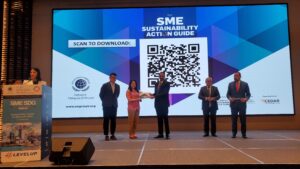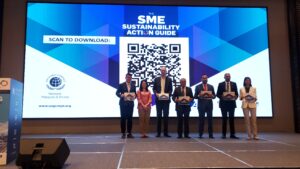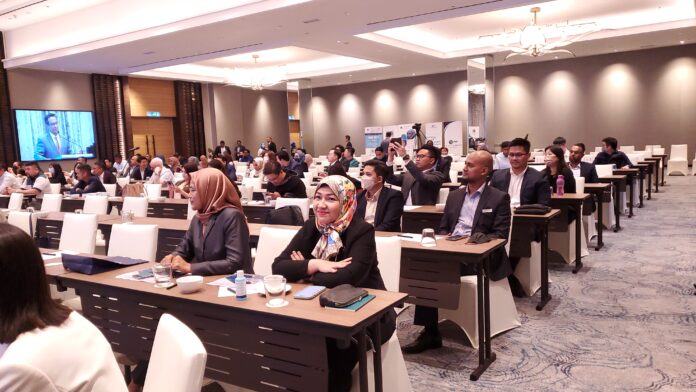Johor Bahru, 10 November 2022 – The UN Global Compact Network Malaysia & Brunei (UNGCMYB) launched the Small, Medium Enterprises (SME) Sustainability Action Guide at the SME SDG Festival today officiated by Datuk Haji Mohd. Noorazam Bin Dato’ Haji Osman, Mayor of Johor Bahru City.
The Guide was developed specifically to assist Malaysian SMEs in adopting sustainability. The SME Sustainability Action Guide explains the importance of sustainability to SMEs and why the adoption of ESG practices makes good business sense. It also gives a clear step-by-step action approach on how sustainability can be implemented.

With the support of Konrad-Adenauer-Stiftung as its Cooperation Partner, and Taylor’s University as its Knowledge Partner, UNGCMYB conducted a study of the sustainability approaches employed by local SMEs to develop the Guide. The study involved roundtable sessions co-organised by UNGCMYB and the Centre for Entrepreneur Development and Research (CEDAR) and interviews with SME business owners who shared their sustainability approaches and how it has positively impacted their businesses.
These gave valuable insights in the unique ways of how SMEs are implementing sustainability and what are the benefits they have seen from embracing it. The sharing of best practices by these business leaders in the SME Sustainability Action Guide will provide much-needed direction to SMEs that are just about to embark on their sustainability journey. SME specific resources play an important role to promote sustainability adoption among SMEs to build resilient and competitive businesses.
“The main goal of producing the SME Sustainability Action Guide was to identify the most practical ways in which SMEs could implement sustainability into their business practices,” said Edey Suresh, Director of UNGCMYB. Edey continued, “A lot of sustainability frameworks in the market are skewed for multinationals and larger corporations that have better access to resources. Local SMEs are in need of guidance with a more pragmatic approach, and also need to be made aware of the existing facilities in the Malaysian market that can encourage them in their sustainability efforts.”

There are many push factors driving sustainability implementation, particularly the shift in consumer demand for sustainable products and the increasing focus by banks on climate-related financial risks. Adopting sustainability allows SMEs to tap into new markets and gain better access to funding.
Miriam Fischer, Director of Konrad-Adenauer-Stiftung Malaysia said, “SMEs are a major force within the Malaysian economy, contributing to a third of the country’s Gross Domestic Product and providing employment for nearly half the workforce. We hope that the resources and practical sustainability advice compiled in this Guide, will inspire the SME sector to make a strong commitment towards adopting sustainability. This will eventually help to build competitive businesses.”
The Guide gives an easy-to-follow 6-step approach to implementing sustainability for SMEs, from learning about sustainability, assessing the business’ current status and engaging with stakeholders, making a solid commitment and then setting suitable targets and reporting sustainability progress. With each of the 6 steps, the reader is provided links to useful resources and practical everyday examples that are simple to emulate. The main sustainability themes covered under the Action Guide are Climate Action, Energy Management, Water, Waste, Human Rights, Living Wages, Diversity, Equality & Inclusivity, as well as Anti-Corruption Policies.
The SME Sustainability Action Guide is published in digital format and can be accessed and downloaded for free at https://www.ungcmyb.org/smesustainabilityactionguide.
